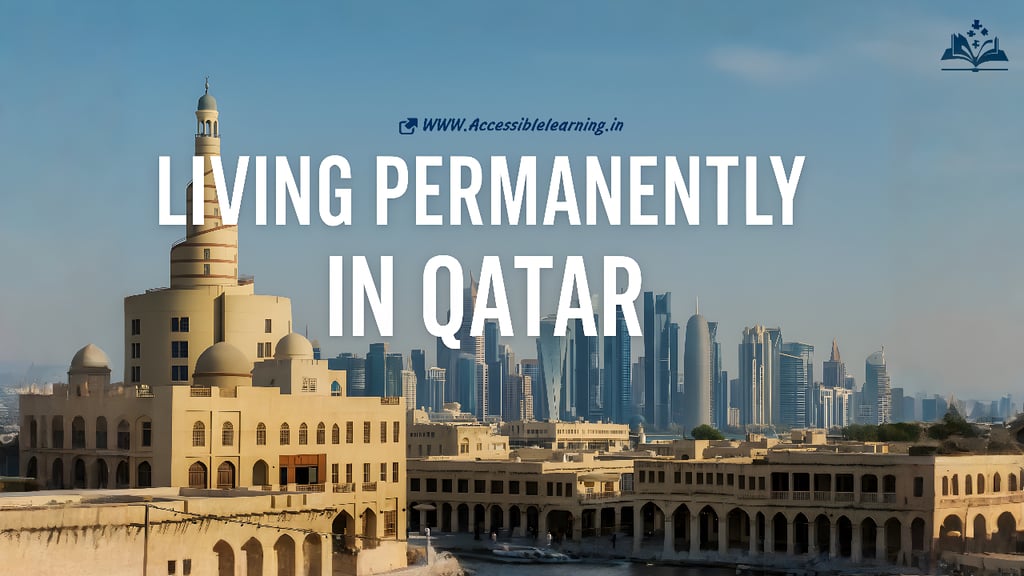
Living Permanently in Qatar – A 12-Year Journey Through Culture, People, and Life in the Desert Jewel
Discover what it’s like to live permanently in Qatar for 12 years—exploring its culture, people, lifestyle, government, and rules in a modern yet traditional Arabian society.
TRAVEL LIFEAWARE/VIGILANTNEPOTISM/SOCIAL ISSUESQATAR
Keshav Jha
10/21/20257 min read


Living permanently in Qatar offers a unique blend of modernity, tradition, and opportunity. Over 12 years in this Arabian Gulf nation, one experiences a profound transformation—not only in the country’s skyline but also in its social fabric, governance, and cultural heartbeat. From the serene desert landscapes to the futuristic city of Doha, Qatar stands as a remarkable example of how rapid development can coexist with strong cultural values.
This in-depth article explores what it’s truly like to live permanently in Qatar—diving into its culture, people, government, lifestyle, economy, and laws—through the lens of someone who has spent over a decade calling it home.
The Essence of Life in Qatar: Tradition Meets Modernity
Qatar beautifully balances its deep-rooted Bedouin traditions with world-class modern living. Over the last decade, expats and locals alike have witnessed Qatar evolve from a quiet desert land into a global hub of business, education, and luxury.
Walking through Doha’s Corniche or Souq Waqif, you see a nation proud of its heritage—traditional clothing, Arabic coffee, and hospitality remain at the core of Qatari life. Yet, step into Lusail City or The Pearl-Qatar, and you’ll find high-end restaurants, luxury apartments, and futuristic architecture that rival any global metropolis.
The Qatari People: Hospitality Beyond Borders
Qataris are known for their warm hospitality and strong sense of community. Living among them for 12 years reveals how much they value family, respect, and generosity. Guests are treated with honor, often welcomed with gahwa (Arabic coffee) and dates—a symbol of respect and friendship.
Despite the country’s traditional framework, Qataris are open-minded and globally aware, especially the younger generation educated abroad or at home in prestigious institutions like Qatar University and Education City.
For expats, adapting to local customs—such as dressing modestly, avoiding public displays of affection, and showing respect during Ramadan—earns immense respect from locals.
Governance and Stability: The Backbone of Qatar’s Success
Qatar’s governance under the Al Thani family is a major reason for its prosperity and stability. The government maintains a vision-driven approach, anchored in the Qatar National Vision 2030, focusing on human development, sustainability, and economic diversification.
Over the years, expats living long-term in Qatar notice the country’s commitment to its people — through world-class infrastructure, safety, and employment opportunities. The nation’s low crime rate, efficient healthcare system, and focus on education and innovation make it one of the most comfortable places to live in the Middle East.
Living Standards and Lifestyle: Comfort in the Desert
Living in Qatar comes with high living standards. Expats enjoy modern housing, international schools, luxury shopping, and top-tier healthcare facilities. Doha, in particular, has grown into a cosmopolitan city filled with vibrant nightlife, fine dining, and multicultural communities.
Over 12 years, one observes how Qatar has become more inclusive—from hosting the FIFA World Cup 2022 to expanding its public transportation (Doha Metro) and promoting sustainability initiatives.
Life in Qatar revolves around community and leisure—weekend gatherings at Katara Cultural Village, desert camping, and beach trips to Al Wakrah or Fuwairit are common among residents.
Rules, Laws, and Daily Etiquette
Qatar’s legal system blends Islamic Sharia with civil law. While strict in nature, the rules are straightforward and ensure peace and order. Over 12 years, one learns to appreciate the discipline that underpins Qatari society.
Key rules to remember:
Alcohol is allowed only in licensed venues and for permit holders.
Modesty in dress is expected in public places.
Public conduct (especially during Ramadan) must be respectful.
Drugs and theft are dealt with severely.
Driving laws are strict, and fines are high for violations.
Despite these restrictions, Qatar offers one of the safest environments in the world—something residents deeply value.
Working and Business Opportunities
For expats, Qatar is a land of opportunity. Over 12 years, one witnesses the evolution of industries—from oil and gas dominance to rapid growth in construction, technology, education, healthcare, and finance.
The Qatar Free Zones Authority (QFZA) has encouraged global investors to set up businesses, while remote work policies and startup incentives attract entrepreneurs worldwide.
The Qatarization program also promotes local talent while welcoming skilled foreign professionals—making the job market competitive yet rewarding.
Cost of Living and Financial Life
The cost of living in Qatar can be high, particularly for housing and schooling. However, the tax-free income offsets much of this. For those who manage finances wisely, Qatar allows a very comfortable standard of living.
Long-term residents often highlight how financial stability and quality of life improve significantly compared to other Gulf nations.
Cultural and Social Life
Living in Qatar for over a decade allows you to dive into its colorful traditions—Eid celebrations, camel races, dhow festivals, and the majestic National Day in December.
Expats can explore art and culture at places like the Museum of Islamic Art, Msheireb Downtown, and Katara Amphitheatre. The art scene, in particular, has flourished—blending Islamic aesthetics with modern creativity.
Social life is community-driven. People form friendships across nationalities—Indian, Filipino, Egyptian, British, and Qatari—sharing meals, festivals, and experiences in harmony.
Education and Family Life
Qatar offers excellent education facilities—from international schools (American, British, Indian, and IB curriculums) to Qatar Foundation universities.
Families find Qatar extremely safe, with family-friendly parks, beaches, and community centers. The environment encourages cultural respect and strong values—making it ideal for raising children.
A Personal Reflection: 12 Years of Growth and Gratitude
Living in Qatar for 12 years is more than just a journey—it’s a transformation. You witness how a desert transforms into a digital, sustainable, and global future. You see how people of 100+ nationalities coexist peacefully, respecting the traditions of the land they live in.
Life here teaches patience, adaptability, and gratitude—and reminds you that progress can exist without losing your cultural roots.
To live permanently in Qatar is to witness a rare balance—where tradition meets progress, faith meets innovation, and community meets ambition. Over a 12-year journey, one realizes that Qatar is not just a country to live in; it’s a nation to grow with.
It’s a place that teaches you to respect culture, value peace, and embrace a shared future—under the golden glow of the desert sun.

Frequently Asked Questions
Q: Can foreigners live permanently in Qatar?
Technically, Qatar doesn’t offer permanent residency in the traditional sense. However, long-term residents can live in Qatar for decades through renewable residence permits linked to employment or sponsorship. In 2021, Qatar introduced a permanent residency card for select expatriates who contribute significantly to the country’s growth—allowing them to own property, invest, and enjoy certain privileges.
Q: Is Qatar safe to live in for families and women?
Absolutely. Qatar ranks among the safest countries in the world with extremely low crime rates. The environment is family-oriented, and women enjoy freedom and respect when observing local customs.
Q: What is the cost of living like in Qatar?
Qatar offers a high standard of living. While rent and schooling can be costly, zero income tax, affordable fuel, and modern facilities balance the equation. Those with company-provided housing or benefits enjoy an even more comfortable lifestyle.
Q: What is the main language spoken in Qatar?
Arabic is the official language, but English is widely spoken across businesses, schools, and public spaces. Most signage is bilingual, making it easy for foreigners to navigate daily life.
Q: What are the main industries and job opportunities in Qatar?
While Qatar was traditionally oil and gas dependent, it has diversified into construction, education, finance, healthcare, tourism, and technology—creating jobs for skilled professionals from around the world.
Q: Can expatriates own property in Qatar?
Yes, but only in designated freehold areas such as The Pearl-Qatar, Lusail City, and West Bay Lagoon. Property ownership can also grant long-term residency benefits in certain cases.
Q: What is the culture like in Qatar?
Qatari culture is deeply rooted in Islamic values, hospitality, and family unity. The people are respectful, generous, and proud of their heritage. Expats who adapt to these values are warmly welcomed.
Q: How strict are the laws in Qatar?
Qatar has strict laws—especially concerning public behavior, alcohol, and dress codes. However, they’re designed to maintain peace and order. Those who respect the local rules find life in Qatar remarkably comfortable and fair.
Q: What are weekends like in Qatar?
The weekend in Qatar is Friday and Saturday. Friday is a holy day when people attend prayers, while Saturdays are for leisure, shopping, or family outings.
Q: Is Qatar a good place to retire?
Yes—Qatar’s safety, luxury, and healthcare make it an appealing retirement destination for expats who have lived there long-term, though retirees typically require ongoing sponsorship or investment-linked residency.
Interesting Facts
The World’s Richest Nation (Per Capita)
Qatar consistently ranks among the wealthiest countries globally due to its massive natural gas reserves and low population.
The Al Thani Royal Family Has Ruled for Over 150 Years
Qatar’s stability and prosperity are largely attributed to the Al Thani family, who have governed since the mid-19th century.
Qatar Hosted the First-Ever FIFA World Cup in the Middle East (2022)
This historic event reshaped global perceptions of the Arab world and showcased Qatar’s extraordinary infrastructure and hospitality.
Education Is Free for Citizens and Subsidized for Expats
Qatar invests heavily in education, offering world-class institutions like Carnegie Mellon University Qatar and Georgetown University in Qatar within Education City.
The Qatari National Dress Has Deep Symbolism
Men wear the thobe, a white robe symbolizing purity, while women wear the abaya, a sign of modesty and grace—reflecting Qatar’s respect for tradition.
The Desert Is a Cultural Symbol
Despite modern urbanization, Qatari families still cherish desert camping (known as “glamping”), falconry, and camel racing—keeping their Bedouin heritage alive.
Qatar’s Population Is 90% Expatriates
Only around 10% of Qatar’s population are native Qataris, while the rest come from India, Nepal, the Philippines, Egypt, the UK, and other nations—creating a true cultural melting pot.
The Museum of Islamic Art Is Built on an Artificial Island
Designed by architect I.M. Pei, this stunning museum combines traditional Islamic architecture with modern minimalism—symbolizing Qatar’s balance of past and future.
Alcohol and Public Behavior Are Regulated
Qatar maintains its cultural identity through strict yet clear laws. Alcohol is available in licensed hotels and restaurants, ensuring respect for both locals and visitors.
Qatar’s National Vision 2030 Is Transforming the Future
The Qatar National Vision 2030 aims to transform the nation into a sustainable, knowledge-based economy—investing in innovation, green technology, and human development.
Subscribe To Our Newsletter
All © Copyright reserved by Accessible-Learning Hub
| Terms & Conditions
Knowledge is power. Learn with Us. 📚


